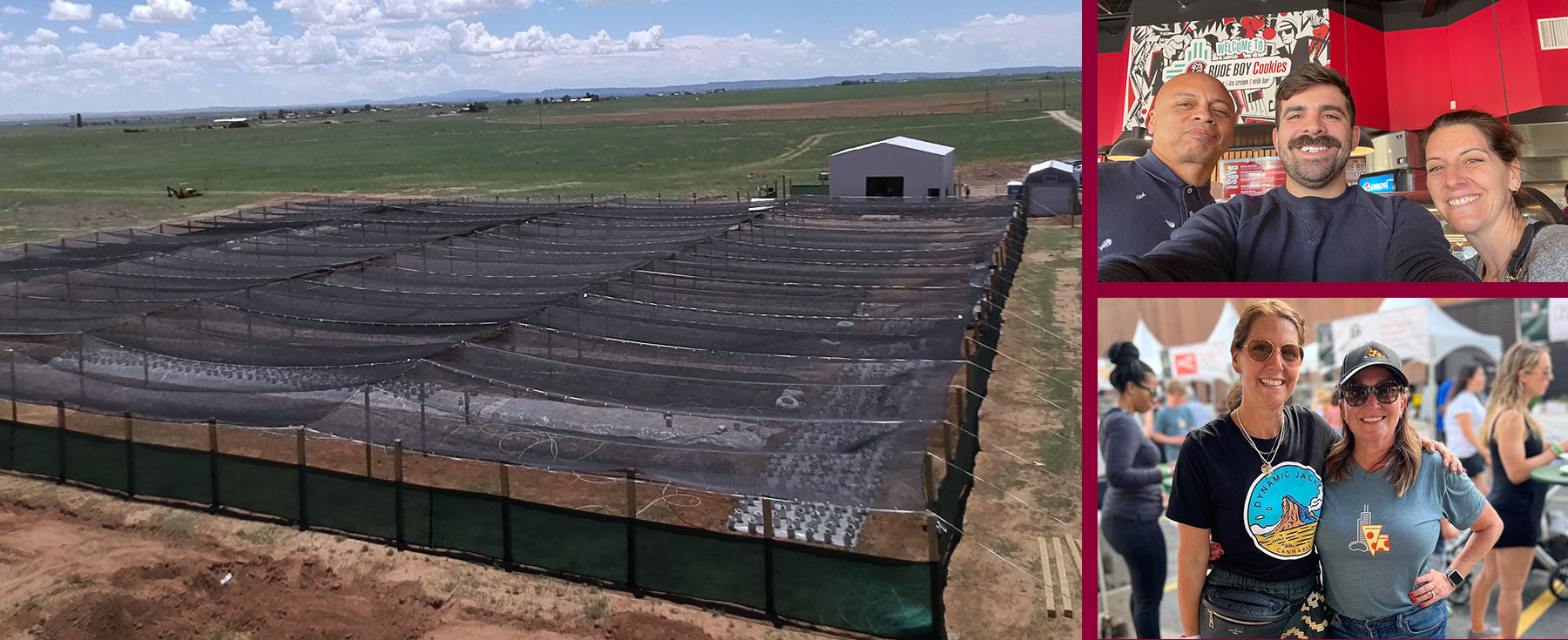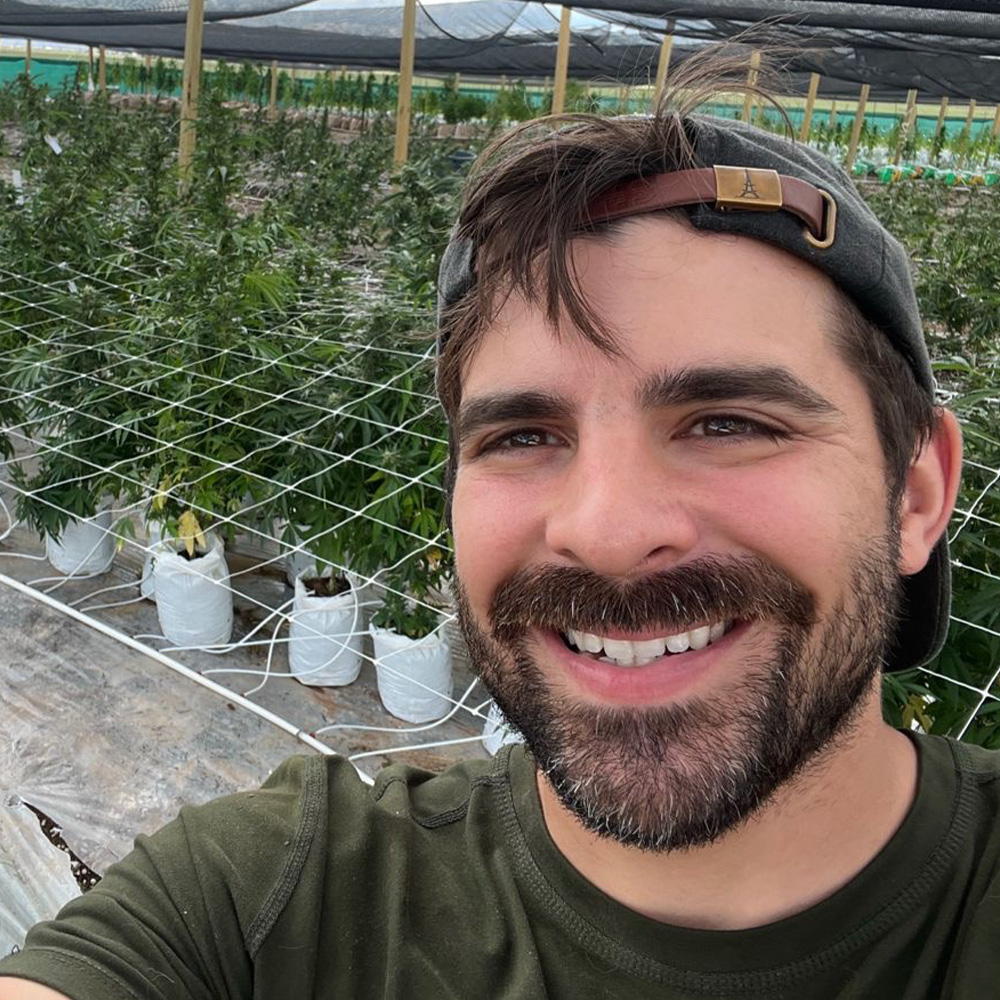Risky business
Alissa Jubelirer (JD ’00) is reaping success as the founder of a growing cannabis company
Alissa Jubelirer has sobering news for would-be entrepreneurs thinking about following her path from corporate law to the cannabis industry.
“It’s not for the faint of heart,” says Jubelirer (JD ’00), CEO of Dynamic Jack Cannabis Co., the New Mexico–based cannabis producer she launched in 2021 with a group of partners that includes fellow Loyola law alum Cole Eastman (JD ’18).
The fledgling company operates a 140-acre farm about an hour outside Santa Fe. Its products, including the super potent Moon Rocks (made with mimosa buds, distillate, and kief), are available in more than 80 New Mexico dispensaries. This spring, Dynamic Jack partnered with Albuquerque bakery Rude Boy Cookies to produce a new line of cannabis-infused cookie dough under the name Rude Girl Goodies.
The company’s early progress has not come easily, but according to Jubelirer, that’s typical of the industry she has chosen.
“It’s not the gold rush everyone thought it was going to be,” she says. “You’re constantly pushing boulder up two feet, and then falling back one. This is an industry where you have to be prepared to take risks.”
Seeking greener pastures
Jubelirer’s career move into cannabis certainly seemed risky. In 2019, she was deputy general counsel for Groupon, looking for opportunities to step up to general counsel role. She figured the cannabis industry would be more likely than traditional companies to take a chance on someone in her position, and she knew her background at a startup would be attractive to cannabis companies in the growth stage, much like Groupon was in the early days. But Jubelirer had apprehensions about cannabis. For starters, cannabis remains illegal under federal law—no small detail for an attorney.
“I had people ask me, ‘You’re a lawyer—how can you go to work on something that’s federally illegal?’” she recalls. “I wondered if I would ever be able to work outside cannabis again, or would always have this scarlet letter? Would I be able to get a mortgage? Would I get flagged at the airport?”
But Jubelirer was intrigued by the new challenges the cannabis industry offered, and opportunities in the business seemed plentiful—especially in Chicago, where several multistate operators had set up shop, creating the closest thing to a Silicon Valley for weed businesses. So, when Chicago-based multistate company Revolution offered her the general counsel position, she took the leap. Jubelirer’s responsibilities, which at Groupon had been limited mostly to employment and compliance, expanded at Revolution to include everything from real estate to M&A to IP to commercial contracts. She had to learn fast.
“I felt like I was drinking from the fire hose,” she says.
Jubelirer was the only woman on the executive team at Revolution, so she jumped at the chance to join an informal networking group of executive-level women working in the cannabis industry. Although cannabis products are increasingly popular with female consumers, the industry remains predominantly male run. A 2022 study by the industry observer MJBizDaily reports that only 22 percent of executive positions in cannabis were held by women.
“One of the things we talked about was the need for women to create generational wealth for themselves, instead of doing it for everyone else,” Jubelirer says of the networking group. “That group served as a great sounding board and was part of what inspired me to start Dynamic Jack.”

Dynamic Jack’s cannabis farm near Albuquerque. Mike Silva, left, owner of Rude Boy Cookies, poses with Eastman and Jubelirer. Jubelirer with Amy Dordek Dolinsky, who is a company partner, board member, and investor.
Setting down roots
Jubelirer chose to apply for cannabis licenses in New Mexico, where recreational, adult-use cannabis had just been legalized and where she has a network of friends, including some fellow Loyola law alumni. Jubelirer entertained grand plans: a farm to start with, and then a consumption area with mountain views, and maybe lodging and food modeled after vineyard properties.
Like any startup, the company needed a shot of capital to get it off the ground. Although the ascent of recreational cannabis to mainstream acceptance has been startlingly swift—with nearly two thirds of Americans supporting legalization, according to a 2022 Pew Research Center survey—Jubelirer knew that raising money in the industry is not that simple. Entrepreneurs hoping to start anew cannabis venture cannot do what most other small business owners can: walk into a bank and secure a small business loan or a line of credit. Most banks avoid both banking for and lending to cannabis companies, Jubelirer says, perceiving them as too high a risk to their FDIC insurance when cannabis is still considered a Schedule I drug by the federal government, akin to heroin and more dangerous than fentanyl. While raising capital is difficult for most businesses, it can be extraordinarily challenging for cannabis business owners.
“Your options are really limited when it comes to getting capital,” says Eastman, a Dynamic Jack partner and the company’s director of legal and compliance operations. “It creates a brutal and unforgiving financial picture.”
Knowing that they could not rely on institutional sources for capital, the Dynamic Jack team turned to nontraditional avenues. The company raised close to $1 million from family and friends using a Silicon Valley–developed open-source investment instrument—a simple agreement for future equity or SAFE—designed for startups in the early stages of fundraising. The company attracted an additional $126,000 in funding through a campaign on the online equity investment platform Mainvest.
“This is an industry where you have to be prepared to take risks.”
If raising capital for a cannabis startup is daunting, navigating the maze of federal and state laws governing it can be downright bewildering. Eastman, who managed the application process for Dynamic Jack in New Mexico, says that applicants in most states are asked to provide detailed plans for security, record keeping, employee training, and dispersal. “These applications are lengthy documents,” Eastman says. “They can be incredibly complicated.” New Mexico places no limit on the number of licenses it issues, but in so-called limited license states, including Florida and Illinois, the application process is often even more prolonged, costly, and complex.
Eastman’s introduction to cannabis law came when he worked, fresh out of law school, as assistant counsel to the speaker of the Illinois House of Representatives during the legislative session that produced Illinois’s Cannabis Regulation and Tax Act, which legalized adult-use recreational cannabis.
“I found the process interesting, and cannabis law seemed like a better fit than more traditional paths,” he says. Eastman was part of the license application team at the multistate cannabis operator Justice Grown (now Justice Cannabis Co.) before joining Dynamic Jack. “The work is fast paced, and you work with a diverse and open-minded group of people who really care about the business.”
After fundraising and the legal labyrinth of the license application process, the gritty work of growing and harvesting remains. There too the Dynamic Jack team learned some hard lessons. Building the outdoor grow turned out to be far more expensive than planned, and they faltered in initial attempts at cultivation. The company began planting in June 2022, not long after it had received its license to grow. One crop with an abbreviated, two-month growing cycle was mostly lost. But another, planted at the same time but requiring four months in the ground, flourished and was ready for harvest in October. Learning from that misstep, Jubelirer eventually came to lean on “legacy growers” who learned their craft in the prelegalization years.

Seeing green
Cole Eastman (JD ’18) finds his niche in cannabis law
Fresh out of law school, Cole Eastman (JD ’18) went to work as assistant counsel to the speaker of the Illinois House of Representatives and got a front-row seat to the legislative process that led to Illinois’s legalization of recreational cannabis in 2019.
“Attending the hearings and listening to the debates, I was excited about the opportunities the new law presented to seek restorative justice for communities most impacted by the War on Drugs,” Eastman says. “I decided to make a go of it in cannabis law.”
Eastman met future Dynamic Jack CEO Alissa Jubelirer in 2020 when he was working at the cannabis company Justice Grown and Jubelirer was interviewing candidates for a position on her team at the multistate cannabis producer Revolution. Though Eastman didn’t think that position was a good fit for him, he and Jubelirer stayed in touch, and she reached out to him to help launch her new cannabis company, Dynamic Jack.
Eastman is a founding partner and director of legal and compliance operations for the New Mexico–based company. His role at Dynamic Jack “varies depending on the needs of the company,” he says. “As is often the case with startups, I’m not always performing tasks that fit within my job description.”
Eastman has helped forge the company’s partnership with Albuquerque bakery Rude Boy Cookies to produce a line of “take and bake” cannabis-enhanced cookie dough called Rude Girl Goodies. The Rude Girl brand has proved to be one of Dynamic Jack’s most successful and is available in about two dozen dispensaries in and around Albuquerque.
“Hammering out the specifics of that partnership, and all the details from packaging to compliance to leasing freezers to placing the products in dispensaries, has been a huge learning experience,” Eastman says.
And, he adds, the company is looking to expand into new markets. “So watch out, Illinois.” –Andrew Santella










